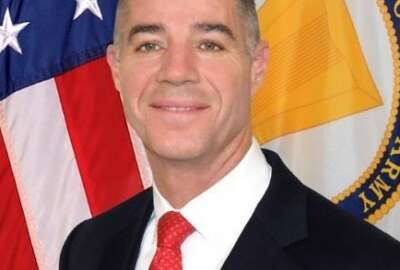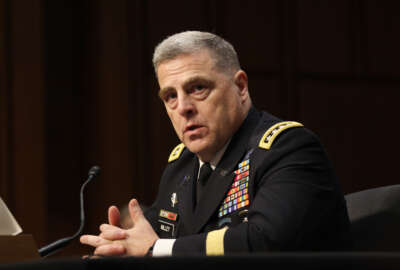
Army Rapid Capabilities Office begins delivering on promises
The Army's quick response acquisition shop is beginning to field technologies.
The Army’s Rapid Capabilities Office is fielding its first technologies less than a year after its initial establishment.
The eight-month-old shop, built to develop products and technologies quickly for Army units, will begin fielding its first electronic warfare technologies this year, said Rapid Capabilities Office (RCO) director Douglas Wiltsie during a May 3 C4ISR conference in Arlington, Virginia.
“Our focus is on ground maneuver [EW]. Our focus is at the brigade and below and it’s the ability to both understand the environment you are in and then use an offensive capability if necessary,” Wiltsie said. “In that environment you’re trying to understand signals of interest and to be able to define where they are and then provide an offense capability. We are looking at both mounted and dismounted.”
RCO will begin fielding both defensive and offensive cyber products next year.
The nature of RCO’s work is mostly classified since its goal is to build technologies that are specific to a unit fighting a particular force.
“It’s all about taking a combatant commander’s requirement where there is a gap, being able to provide a material solution, and it’s not always material, and taking that gap from here to here,” Wiltsie said as he shortened the distance between his hands.
RCO’s initial task was to put an emphasis on focusing on EW, cyber, survivability and position and navigation and timing. Those technologies will be developed on the fly for specific needs, but not for an overall Army purpose.
Still, the office is growing.
Wiltsie said the office is now capable of handling five to 10 projects simultaneously, but that may get bigger in the future.
The office started off last year with about $25 million, Wiltsie said.
“It will grow from there. … We are trying to work with both the [congressional] authorization committees and the appropriation committees on developing the ability to have some flexibility in how the money is used from a [research and development] perspective,” Wiltsie said. “The focus is, as in the institutional programs, it’s very clear by year what you’re doing.”
Wiltsie said RCO doesn’t work like that considering it works on the demands of the combatant commander’s current needs.
RCO is trying to negotiate some deal with Congress where it can work within a fund range, where 95 percent of the budget is solidified beforehand, but 5 percent may be malleable.
RCO is taking the Silicon Valley route of working by using rapid prototyping and trying to fail fast.
The office started making headway in the first month of its existence.
“We have three test exercises going on as part of the advanced warfighter assessment out in Fort Bliss in October. One for cyber and one for electronic warfare to help us understand not only the problem set, but the equipment that we have today and what capability if it’s repurposed will it provide,” Wiltsie said in October when the office was in its nascent stages. “From there, you’re going to see things before Christmas looking for information, so it’s moving. We need the board to tell us specifically we are on the right track.”
The Army plans to increase contract speeds through the use of Other Transaction Agreements, a contracting vehicle that groups companies into consortiums.
Once in the consortiums, the companies and the Army agree to set rules that quicken the acquisition process.
“There are five that exist today … we’ve utilized two of them. The one I’ve utilized the most is the C5 consortium, which is basically focused on cyber and so we’ve used them to build capability that the cyber teams need and we’ve had great success with it. I want it to go faster. It has not gone as fast as I want it to, but it’s an opportunity to go quick, see what’s available, hone the requirements without a lot of process and then get something in that we can prototype,” Wiltsie said.
Copyright © 2025 Federal News Network. All rights reserved. This website is not intended for users located within the European Economic Area.
Scott Maucione is a defense reporter for Federal News Network and reports on human capital, workforce and the Defense Department at-large.
Follow @smaucioneWFED
Related Stories





